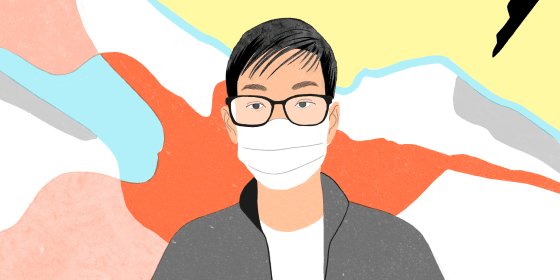Throughout the day, grocer Patrick Mock hands out masks, from both his own stash or through donations facilitated by his local state assembly member Yuh-Line Niou, to homeless people who enter 46 Mott Street, a grocery and bakery in New York City’s Chinatown. He also makes sure those without resources in the neighborhood are fed and other essential workers get a free beverage as they push through the pandemic.
Though he works in an area that has seen the effects of rising anti-Asian sentiment rip through the community, he said he hasn’t had much time to process his own emotions regarding the pandemic or the subsequent racism. Rather, he aims to focus on the task at hand.
“One thing you come to work for is to serve people, especially in their time of need,” he told NBC Asian America. “That’s the best feeling you can get.”
Mock, who has been working at 46 Mott Street for roughly three years, runs the front of the shop, helping out customers and working the register. In April, his establishment began to give out roughly 100 free meals a day, with the help of outside funding for low-income, homeless or elderly individuals.
“In a pandemic, it makes you pull yourself up from deep down,” he said. “You've got to step up a little more and if I need to do that right now, this is what I need to do.”
The 26-year-old explained that he grew up in the neighborhood and has worked in hospitality and service for the past eight years. While community members often urge youth to expand beyond the enclave, he’s always felt a loyalty to the area. The pandemic hasn’t changed that as Mock explained he’ll stay open throughout the public health crisis in part for the underserved populations he’s been familiar with for some time.
Asian Americans have the highest poverty rate in the city compared to all other racial groups, with seniors being particularly vulnerable. A study from the Asian American Federation of New York revealed that roughly 1 in 4 elders live in poverty. And many of these vulnerable populations are concentrated in the Chinatown neighborhood, where 36 percent of individuals are of Asian descent.
Being one of the few establishments left open in an area with a significant Asian population also comes with its own anxieties, particularly as the nation experiences a significant uptick in anti-Asian hate attacks. New York City’s Commission on Human Rights recorded 248 reports of harassment and discrimination related to COVID-19 since February and more than 40 percent of those incidents are anti-Asian.
Mock hasn’t ignored the reports and though he says he doesn’t dwell on the heightened levels of discrimination, the issue does weigh on him at times. He lives a few blocks away from the shop, but will opt for different routes, walking on larger streets to get to and from work so he can better scan his surroundings.
“I go home around 11 or 12 now because after [store hours], we restock all the shelves, we prep, we bake,” he said. “When I go home now, I have more of an adrenaline, anxiety rush.”
For the most part, Mock says, he brushes many of his fears to the side during the work day.
“Yes, I could be afraid, I could be worried. I could be scared for me,” he said. “I know I need to push through that because there's people behind me right now that come to see me or buy from me every day that need help and I'm supporting them.”
He added: “All the nurses are doing it. They go to work everyday. There’s no excuse. They know what they're getting themselves into. I know what I'm getting myself into.”
Working for long hours gives Mock a vantage point. He not only interacts with customers who are weathering their new lives indoors, oftentimes attempting to quell their unease, but also with essential workers. He said he’s talked to many tired postal workers who’ve had to continue making deliveries, as well as numerous medical professionals who have endured 12-hour shifts. For them, he offers free coffee and tea and keeps a sign outside the shop to remind them they have a reliable place to stop by.
“What can I do to make your life easier? What you're doing now is helping us a lot,” he said of other essential workers. “I want to do more. … Having a hot cup of coffee or a hot meal makes a big difference. That's what I learned through my experience.”
Mock’s kindness has not gone unnoticed and he says that many of his customers worry for him. Several patrons have dropped off masks and other protective materials while others leave hefty tips. In one instance, he recalls, a woman left a $10 tip for a $2 purchase. He doesn’t take those acts lightly and said these small gestures fuel him to continue working through the pandemic.
“They're worried about me every day because they know I'm open. They’ll call me 10
times, making sure I'm washing my hands,” he said. “We're helping each other out. They want us to take care of ourselves and we are. They remind us every day.”
For now, Mock said he’s taking the situation day by day, keeping himself calm by checking in and reconnecting with friends and family. He doesn’t believe there will be an easy solution to the rising anti-Asian sentiment but he hopes people can put their politics aside.
“We need to be united right now. That's the best way I could say to fight racism. It's unity, solidarity,” he said.
This story is part of our Asian Pacific American Heritage Month series, "AAPI Frontline," honoring essential workers who are serving their communities during the coronavirus pandemic. Read more here.
Follow NBC Asian America on Facebook, Twitter and Instagram.
